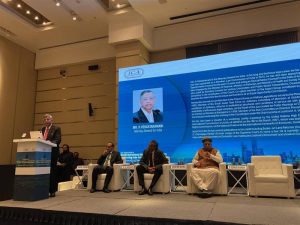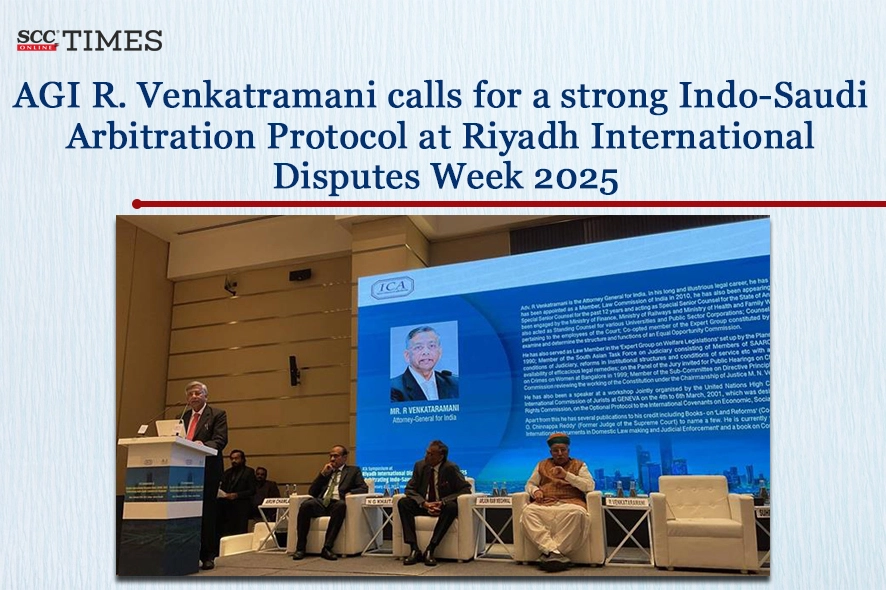Mr. R. Venkatramani, Attorney General for India, delivered a special address at the Riyadh International Disputes Week 2025 (RIDW 2025), emphasising the need for a mutually beneficial Indo-Saudi arbitration framework. In his thought-provoking address, he underscored the deep historical, economic, and legal ties between India and Saudi Arabia while advocating for a modernised dispute resolution system that fosters international cooperation.
His speech, rich in historical context and forward-looking proposals, underscored the growing role of arbitration in global trade and investment and the potential for the two nations to pioneer a new era of dispute resolution.

A Historic and Strategic Partnership
Mr. Venkatramani described India and Saudi Arabia’s partnership as a “growing union”—one that extends beyond commerce and legal frameworks to encompass cultural and historical bonds. He highlighted his deep appreciation for the warmth and hospitality of Saudi Arabia and compared the evolving relationship between the two nations to a “joint family journey”, signifying long-term commitment and shared prosperity.
Reflecting on the presence of Minister for Law and Justice Mr. Arjun Ram Meghwal, as well as other eminent dignitaries, he noted that India’s approach to partnerships is built on loyalty, stability, and mutual growth. He praised India’s commitment to maintaining enduring relationships, stating, “India, once wedded to a partner, remains loyal and far away from divorces, unlike fickle minds.”
The Role of Arbitration in Global Dispute Resolution
Mr. Venkatramani traced the evolution of arbitration as a tool for international dispute resolution, drawing parallels to ancient trade routes like the Silk Road, which facilitated cross-border trade and economic exchange. He highlighted the emergence of common legal principles among civilizations, from Ancient Rome to the trading communities of India and China, and how these historical interactions paved the way for modern arbitration frameworks.
“Arbitration like the idea of constitution as a Rule of law principle has now become a global dialogue and a framework common to all humankind.”
He elaborated on the role of arbitration in maintaining economic stability, ensuring efficient dispute resolution, and fostering long-term commercial relationships. While arbitration initially developed as a means of resolving trade disputes in Europe, it has since evolved into a globally accepted legal mechanism, led by institutions like the UNCITRAL, ICC, ICSID, and the Permanent Court of Arbitration.
India’s Journey in Arbitration Reform
India’s commitment to becoming a global arbitration hub was a key theme in Mr. Venkatramani’s address. He detailed India’s progress from its 1940 Arbitration Law to the post-UNCITRAL Arbitration and Conciliation Act of 1996, which brought Indian arbitration practices in line with international standards.
He further outlined India’s key arbitration reforms:
- Arbitration and Conciliation Act Amendments (2015, 2019, 2021) — Strengthening arbitration procedures, minimizing judicial intervention, and enhancing the enforceability of arbitral awards.
- India International Arbitration Centre (IIAC) — Established to position India as a leading arbitration hub.
-
The Mediation Act, 2023 — Institutionalizing mediation as a key mechanism for commercial dispute resolution.
He acknowledged India’s initial challenges in arbitration, including concerns over judicial intervention, but asserted that the country has now reached a “milestone and is poised for a great international breakthrough.”
The Need for an Indo-Saudi Arbitration Protocol
Mr. Venkatramani highlighted Saudi Arabia’s legal reforms and its growing openness to arbitration, calling for a structured Indo-Saudi Arbitration Protocol. He emphasised that both nations must capitalise on their strong economic ties and legal advancements to create a robust dispute resolution framework.
He proposed a two-stage process for establishing an Indo-Saudi Arbitration Framework:
1. Mutual Agreement on Legal Convergence — Identifying shared legal principles and arbitration practices that respect the distinct judicial traditions of both nations.
2. Inter-Country Enforcement Protocol — A treaty-level agreement ensuring the recognition and enforcement of arbitral awards between India and Saudi Arabia, thereby providing legal certainty to businesses and investors.
He further elaborated that the Indo-Saudi Arbitration Protocol should include key considerations such as:
- Arbitrability of issues and sectors where arbitration should be preferred.
- Application of agreed legal principles to ensure fairness and consistency in dispute resolution.
- Expedited arbitration procedures for time-sensitive commercial disputes.
- Enforcement of arbitral awards within limited timeframes to reduce uncertainty.
- Creation of specialised arbitration tribunals for handling Indo-Saudi commercial disputes.
-
A reporting mechanism for periodic evaluation, ensuring continuous improvement of arbitration practices.
A Call for Greater Legal Collaboration
Mr. Venkatramani called on both the governments to form a dedicated working group comprising legal experts and policymakers from India and Saudi Arabia to develop the proposed arbitration framework.
He also extended an invitation for Saudi representatives to visit India for the next stage of discussions, proposing a Saudi-India Arbitration Convention in New Delhi to finalize these agreements.
He ended on a note of optimism, stating, “We promise goodwill and green pastures,” signalling India’s readiness to strengthen legal and economic collaboration with Saudi Arabia.






